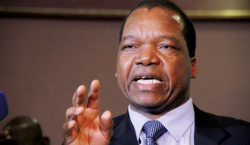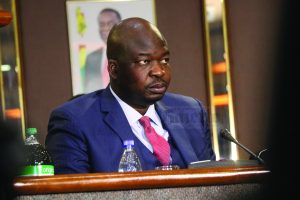

THE multi-million-dollar platinum project by Bravura Zimbabwe is once again shrouded in uncertainty after reports surfaced this week that government pulled out of a payment arrangement to settle a $73 million debt owed to former concession owners, Amari Zimbabwe.
Bravura was in 2019 allocated platinum claims near Serui formerly jointly owned by Amari and Zimbabwe Mining Development Corporation (ZMDC), after Amari was controversially stripped of concessions rights by the then mines minister Obert Mpofu in 2011.
Amari sued government for the concession loss and was in 2014 awarded $50 million in compensation by the International Court of Arbitration, an order which government has not complied with while the South African mining company has been failing to enforce it.
Factoring in an annual interest rate of 5% since 2014, Amari is now claiming over $73 million from government.
Some government officials last year indicated that Nigerian billionaire and Bravura owner Benedict Peters had agreed to settle the government’s debt and has offered to pay US$15 million to Amari to pave way for his company to commence operations at the platinum concessions.

Finance ministry secretary George Guvamatanga
While government has refused to publicly acknowledge the debt and the compensation deal, it emerged this week that Bravura was already in the process to payoff Amari before government suddenly put a halt to the deal.
A letter written by Finance secretary George Guvamatanga to the ministry of Mines seen by the Financial Gazette referenced ‘Cancellation of escrow account arrangement between Bravura and government of Zimbabwe” shows that government has now decided not to go ahead with the payment arrangement.
“I make reference to your letter dated 23 November 2021, wherein you gave clarification on how the Amari debt arose and how it has accumulated to about $73 million.
“Treasury notes your request for this debt to be assumed by the state on account of the limited financial capacity of ZMDC. It is however, Treasury’s considered view that this debt cannot be assumed by government as transferring of this obligation will expose a wider array of government assets to additional litigation,’ reads the letter addressed to Mines secretary O Moyo dated 17 January 2022.
An escrow account is a third-party account where funds are kept before they are transferred to the ultimate party, providing security against scams and frauds especially with high value or dispute-prone assets.
It remains unclear whether Bravura had already put funds into the escrow account by the time Guvamatanga cancelled the deal.
Bravura has not been willing to go public with the settlement offer as they fear to be roped into the legal dispute between government and Amari, who last month filed a complaint with United States’ District Court for the District of Columbia to have the 2014 arbitration ruling enforced.

Ian Small-Smith, a lawyer acting for Amari told Bloomberg in 2019 that Peters had approached the South African company seeking a settlement.
Industry and government sources also indicated that Peters’ willingness to payoff Amari hinged on Bravura’s conformation of economically viable platinum resource at the disputed concessions.
Guvamatanga declined to comment on the cancellation of the escrow account and referred all questions to the ministry of Mines, who did not respond to queries sent to them by the time of going to press.
In 2020 Bravura said it had raised US$1 billion to develop the platinum mine and set an ambitious target to start mine construction within 18 months.

However, industry experts remain sceptical about Bravura’s mining credentials as the company has no expertise in platinum mining. “Moreover, developing the mine will be no easy task. The platinum group metals deposits at Hartley have in the past proved too complex to mine, even for experienced miners”.
The scepticism over Bravura’s technical expertise and financial muscle is centred on its billionaire owner who has been hogged by controversy in the past. Peters was forced to flee his native Nigeria and now lives in Ghana after reports of his improper financial conduct emerged in Africa’s populous country.
Early last year, Nigeria’s Centre for Social Justice, Equity and Transparency asked the country’s Economic and Financial Crimes Commission (EFCC) to arrest and prosecute Peters over allegations bordering on conspiracy, fraud, tax evasion, corruption and money laundering. Peters, who is chairman of the Aiteo Group of Companies, the largest domestic oil producer in Nigeria, denies the charges and alleges a political plot by his rivals.
The controversial businessman’s Aiteo was investigated on charges relating to asset transfers by EFCC and was cleared in 2017. That same year, a court also cleared Peters on allegations of bribery and money laundering.
He won a court order in 2018 to have the EFCC remove his name from a ‘wanted list’.
His entrance into Zimbabwe’s mining sector comes at a critical time when the country is in desperate need of foreign investment to stem decades of economic decay.
Zimbabwe’s desperation for foreign investment has often exposed the country to dubious investors who manipulate political connections to secure mining concessions for speculative purposes, analysts said. – mining.ac.org